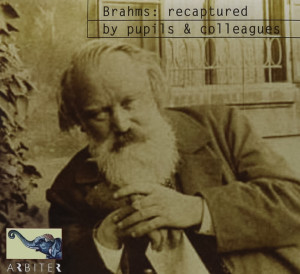Johannes Brahms died in 1897 in Vienna. He had heard a concert of his Symphony number 4 at the Musikverrein when he was already deathly ill with Cancer. He died two weeks later in Vienna.
This interesting collection on two CD’s contains recollections by people who knew Brahms personally.
CD1:
Carl Friedberg: Chopin – Polonaise; Schubert – Moment Musical no.3 (rec. Sept 1948, Kansas City)
Johannes Brahms: Brahms – Improvisation on Josef Strauss’s Die Libelle (rec. Dec 1889, Vienna)
Carl Friedberg: Beethoven – Piano Sonata no.1 (rec. 1949, New York), Piano Sonata in E, Rondo a Capriccio (rec. 1948, Kansas City)
Trio of New York: Brahms – Piano Trio in B (rec. Dec 1939, New York),
Rhapsody in B (rec. 1949, New York), Piano Trio in C (rec. 1939, Philadelphia), Ballade in G (rec. 1949, New York)
CD2:
Edith Heymann: Talk on Clara Schumann (rec. 1949, London)
Carl Friedberg: Friedberg recalls meeting Brahms (rec. 1951, New York)
Marie Baumayer: Schumann – Pedal Etude no.4 (rec. 1910, Vienna), Arabeske (rec. 1951, New York)
Ilona Eibenschütz: Schumann – Kreisleriana (rec. 1950s, London);
Brahms – Ballade op.118 no.3 (rec. 1903)
Etelka Freund: Brahms – Variations on a theme by Schumann (rec. 1959, Virginia), Rhapsody (rec. 1950, New York); Bartok – For Children (rec. 1951, New York)
Carl Friedberg: Brahms – Piano Concerto no.2 (rec. 1951, New York)
Today Brahms is played everywhere and listeners expect his music to be shaped into a well-defined, inflexible entity. However the above newly discovered recordings overturn this accepted view of his art. In these performances we are exposed to a language that gradually disappeared after the composer’s death in 1897.
All of the performers on this CD were given by pianists who heard and knew Brahms, and who received his musical blessings. They all understood that Brahms composed new music, flirted with improvisation, and was influenced by ethnic rhythms. Their perception of the great composer is so vastly unlike that of musicians and audiences today that the difference cannot be overstated.
This CD also contains a unique recording made by Brahms in 1889.

